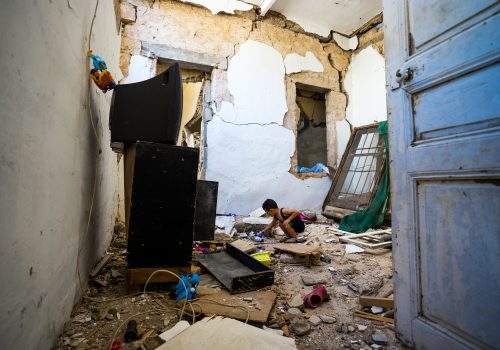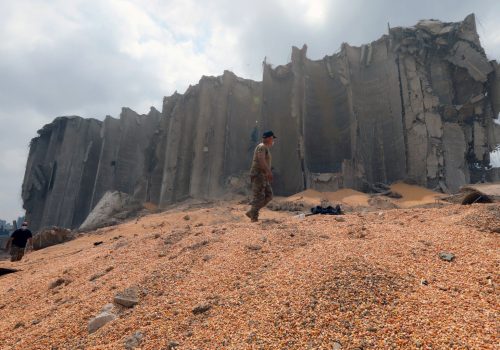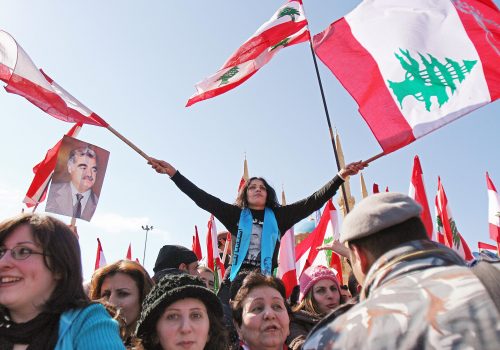Lebanon is facing two crises. Will the new prime minister survive?
An investigation into a devastating explosion at Beirut’s port on August 4, 2020 has sparked a political crisis in Lebanon that has led to deadly violence on the streets and threatens to derail the government only weeks after it was formed. And, as Lebanon’s embattled Prime Minister Najib Mikati attempts to resolve the crisis, a fresh spat with Saudi Arabia and other Gulf countries has cast doubt on whether his government can survive.
At the heart of the Beirut port crisis is Tarek Bitar, the judge who has been doggedly running the investigation since February despite ever-increasing pushback from current and former senior officials who find themselves in his spotlight. Some of them have been indicted by Bitar and summoned for questioning. But, so far, none of those subpoenaed have shown up for questioning and some have filed counter lawsuits against the Lebanese state. In recent weeks, the powerful Lebanese militant group Hezbollah has stepped up its criticism of Bitar, accusing him of bias and demanding that he be dismissed. The Iran-backed party’s unusual level of hostility toward Bitar has raised some eyebrows, as no officials from the party have been summoned for questioning or been indicted—only a handful of its political allies.
Last year, the massive Beirut port explosion devastated a large swathe of east Beirut, leaving more than 220 people dead and thousands wounded. The explosion was caused by a consignment of ammonium nitrate stockpiled in poor conditions since 2013. Some 2,750 tons of ammonium nitrate were reportedly loaded onto the MV Rhosus in Georgia and was destined for Mozambique. Apparently, it docked in Beirut in November 2013 because the ship was experiencing safety problems, but the Rhosus never left due to a legal dispute. In October 2014, the ammonium nitrate was transferred from the Rhosus to Hangar 12 in the port. Its existence and the hazardous nature of the substance were made known to numerous officials in the security services and successive governments, but nothing was done to safeguard or remove the explosive material.
In December 2020, Bitar’s predecessor as head of the investigation, Fadi Sawan, charged the then caretaker Prime Minister Hassan Diab, two former ministers of public works, Ghazi Zeaiter and Youssef Fenianos, and former Finance Minister Ali Hassan Khalil with criminal negligence in relation to the port explosion. Two of the ministers filed a complaint before Lebanon’s top court on the basis that they enjoyed immunity from prosecution as serving members of parliament. Sawan’s objectivity was also questioned as his home had been damaged in the explosion. The court upheld the complaint and Sawan was removed in February and replaced by Bitar. However, Bitar is experiencing the same difficulties as his predecessor, with those charged using legal means to block the investigation and refusing to attend questioning sessions.
In a speech in early August, Hezbollah Secretary-General Hassan Nasrallah accused Bitar of bias and leading a “politicized investigation.” The following month, in September, Wafic Safa, a top Hezbollah security official, delivered a warning to Bitar via a reporter, saying, “We have had it up to here with you. We will go along with you until the end of the road but if it doesn’t work, we will remove you.”
Nasrallah escalated his criticism of Bitar in another speech on October 12, implicitly accusing the judge of targeting political allies of Hezbollah and insisting that he be dismissed. On the same day, in a heated cabinet session, ministers linked to Hezbollah and the Amal Movement, a Shia party allied to Hezbollah, demanded that the government step in to remove Bitar, amid warnings that if action was not taken, there could be trouble on the streets and the ministers might resign.
Two days later, on October 14, Hezbollah and Amal supporters marched to the Justice Palace to demand Bitar’s ousting. It turned into a gun battle when protestors entered the Christian neighborhood of Ain Rummaneh. The precise circumstances about how the violence began is still unclear, although the Lebanese Forces, a Christian party headed by Samir Geagea, had been placed on alert when news of the march circulated the previous evening. Seven people were killed and dozens wounded before calm was restored.
The government of Prime Minister Mikati has not met since the violence and the standoff over Bitar’s fate endures. Hezbollah’s hostility toward Bitar has some striking parallels to the Iran-backed party’s fervent efforts a decade and a half ago to block the formation of the Special Tribunal for Lebanon (STL), charged with investigating the 2005 assassination of Rafik Hariri, the country’s former prime minister. In November 2006, on the eve of a government vote to request that the United Nations establish the tribunal, all five Shia ministers—including those of Hezbollah and Amal—walked out. The vote went ahead anyway and the STL was eventually formed.
At the time, Hezbollah’s opposition to the STL was seen as an attempt to defend its ally, Syrian President Bashar al-Assad, who was widely believed to have ordered Hariri’s murder. But, by 2010, it transpired that the Hariri investigation was heading in the direction of Hezbollah. In January 2011, when the STL was close to issuing its first indictments, Hezbollah and its allies toppled the government by resigning. The government was then headed by former Prime Minister Saad Hariri, Rafik’s son, an adamant supporter of the STL process. He was replaced by Mikati in June 2011, who is also the current prime minister.
Critics of Hezbollah have accused the party of responsibility for the ammonium nitrate, although no evidence has emerged. Such accusations were fueled by a report in January by Lebanon’s Al Jadeed TV, station which found that the company that purchased the material, the London-based Savaro Limited, shared an address with three Syrian businessmen whom the United States sanctioned for supporting the Assad regime. Although there is no evidence yet directly tying the Syrian businessmen to Savaro, the connection has raised speculation about whether the final destination of the Rhosus was always intended to be Beirut and not Mozambique.
Ammonium nitrate has uses as a fertilizer, but it can also be used to make explosives. The lax security at Beirut and allegations of corrupt activities at the facility could have allowed the possibility that some of the material was smuggled to Syria and turned into barrel bombs used by the Syrian army. The theory that some of the ammonium nitrate was removed from Beirut has been strengthened by the recent publication of two technical studies, both of which claim that the actual amount of ammonium nitrate that detonated was only an estimated 520 tons, not the 2,750 tons that was deposited in the hangar in 2013. The inference is that almost 80 percent of the explosive chemical had been removed, raising the questions: by whom and for what purpose?
The deadlock over Bitar’s fate persists, with the possibility that if he isn’t dismissed, the ministers linked to Hezbollah and Amal and an allied party, the Marada, will resign. Such a move could collapse the government, or at the very least, thwart its ability to tackle the grave economic crisis Lebanon currently endures. It could also threaten the timetable for parliamentary elections scheduled at the end of March 2022. Through its actions over the past two months, Hezbollah’s desire to remove Bitar appears to be considered a higher priority over helping the country embark on the desperately needed path to economic recovery.
As if this headache was not enough for Prime Minister Mikati, Hezbollah’s political dominance in Lebanon has landed the country in a heated row with Saudi Arabia. Riyadh has expelled the Lebanese ambassador, recalled its own from Beirut, and slapped an import ban on Lebanese agricultural products. The United Arab Emirates and Bahrain have also severed diplomatic relations and called on their citizens to depart Lebanon immediately.
The catalyst for the spat was comments by Information Minister George Kordahi, in which he criticized the Saudi-led coalition’s war against Houthi rebels in Yemen. The comments were recorded before he was appointed minister in September, but the Saudi leadership is demanding Kordahi’s resignation and more broadly decrying the influence Hezbollah—and therefore Iran—has over Lebanon. Hezbollah has thrown its full weight behind Kordahi, once again turning Lebanon into the front line in the regional struggle between Iran and Saudi Arabia.
On November 5, Mikati in a speech urged Kordahi to resign in order to put the “national interest first” so that ties can be restored with Saudi Arabia. He also hit out at Hezbollah and its allies, without specifically naming them, for attempting to back Kordahi and prevent him from resigning. “Mistaken are those who think that obstruction and political escalation are the solution,” he said.
How Kordahi and Hezbollah react to Mikati’s statements remains to be seen. However, for a government formed less than two months ago after more than a year of bitter political wrangling, it is becoming increasingly doubtful if it will survive long enough to reach the date of parliamentary elections four months away.
Nicholas Blanford is a nonresident senior fellow with the Middle East Security Initiative at the Atlantic Council’s Scowcroft Center for Strategy and Security.
Further reading
Thu, Sep 10, 2020
Forgotten quarter: Beirut blast survivors in the Karantina neighborhood
MENASource By
Journalists Zahra Hankir and Lynn Chaya spoke to dozens of survivors about their experiences before, during, and after the August 4 Beirut blast. Here are some of their stories.
Fri, Aug 7, 2020
Ammonium nitrate didn’t belong to Hezbollah, but they knew about its dangers
MENASource By
Hezbollah is acutely aware of the danger that such chemicals—even if not of a military grade—pose to nearby civilians, perhaps more so than any other entity in Lebanon.
Tue, Jul 13, 2021
The Special Tribunal for Lebanon: What does its closure mean for Lebanon?
MENASource By Nicholas Blanford, David Daoud, Gissou Nia, Reem Salahi
The Special Tribunal for Lebanon (STL) is set to cease operations at the end of July due to lack of funds as Beirut sinks deeper into economic and political crisis. Atlantic Council experts react to what the closure means for Lebanon.
Image: Lebanese Prime Minister Najib Mikati speaks during an interview with Reuters at the government palace in Beirut, Lebanon October 14, 2021. REUTERS/Mohamed Azakir


